The following article summarizes many of the changes in Russia over 17 years under Vladimir Putin’s rule. All of the information presented is based on empirical data, most of it from western sources like the World Bank, Ernst&Young, Vtsiom, Ipsos and Gallup. Virtually none of this information was presented in any western corporate press with the notable exception of Forbes magazine (which took the information down after a few weeks). In addition to the below, I’ve subsequently published an article in three parts titled, “Is Vladimir Putin evil?“
Beware of the false prophets… You will know them by their fruits. Grapes are not gathered from thorn bushes nor figs from thistles, are they? So every good tree bears good fruit, but the bad tree bears bad fruit
Matthew 7:16
On 26th July 2014 British magazine “The Economist” published an article titled “A web of lies,” opening with the following two sentences: “In 1991, when Soviet Communism collapsed, it seemed as if the Russian people might at last have the chance to become citizens of a normal Western democracy. Vladimir Putin’s disastrous contribution to Russia’s history has been to set his country on a different path.” Well, we have already seen how Russia fared in the 1990s after Soviet communism collapsed. For some reason, the bright minds at The Economist thought this path was so promising, it was a real shame – a disaster, no less – that Vladimir Putin took Russia on a different one. Let’s take a closer look, shall we, at Mr. Putin’s “disastrous contribution.”
To start with, Putin played the pivotal role in keeping the country from disintegrating. When he came to power, Russia’s regional governors were writing their own laws, disregarded presidential instructions and were not even returning their republics’ tax receipts to the Federation’s purse. Mikhail Gorbachev stated that Putin “saved Russia from the beginning of a collapse. A lot of the regions did not recognize our constitution.” [1] But this historical feat was only the starting point of the subsequent renaissance of the nation. Its economy returned to growth and became more vibrant and diverse than it had been perhaps since the reforms of Pyotr Stolypin of the early 1900s.
Economic reforms
In 2000, Russia was one of the most corrupt countries in the world. Without instituting draconian purges Putin took on the oligarchs and steadily curtailed their power, gradually returning Russia to the rule of law. By 2016 his government reduced corruption to about the same level as that of the United States. That was the empirical result of the annual study on corruption published in 2016 by Ernst & Young.[2] The global auditing consultancy asked respondents around the world whether in their experience, corruption is widespread in the business sector. Their survey, which was conducted in 2014, indicated that only 34% of their Russian respondents thought so, the same proportion as in the United States, and below the world average of 39%. Things have probably improved further since then as Vladimir Putin stepped up a high-profile anti-corruption campaign that led to investigations and prosecution of a number of high level politicians around Russia. Even highly ranked members of Putin’s own political party were not spared.[3] The unmistakable message of such campaigns was that corruption would not be tolerated and that it would be aggressively investigated and prosecuted. Some of the best evidence that Putin’s various anti-corruption measures have had effect can be found in World Bank’s Enterprise Surveys which ask businessmen the question, “was a gift or informal payment expected or requested during a meeting with tax officials?” In 2005, nearly 60% of respondents answered affirmatively. By 2009 this number was 17.4% and by 2012 it had dropped to only 7.3%.
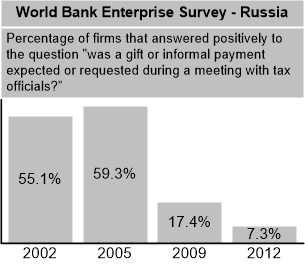
Putin’s government also made impressive advances in making it easier for entrepreneurs and small businesses to set up shop, raise capital and operate in Russia. According to World Bank’s annual “Doing Business” report, which ranks 190 world economies on a set of attributes such as the ease of starting a business, obtaining construction permits, obtaining electricity, raising credit, and enforcing contracts. On all the metrics combined, Russia managed to climb from 124th place in the world in 2012 to 40th in 2017.[4] Thus, within only five years, Russia had vaulted an impressive 84 positions in World Bank’s ranking. This was not a random achievement but the result of President Putin’s explicit 2012 directive that by 2018 Russia should be among the top 20 nations in the world for ease of doing business.
One of the strategically important sectors where Russia has made striking progress is its agricultural industry. After the disastrous 1990s when she found herself dependent on food imports, Russia again became self-sufficient in food production and a net food exporter. By 2014, Russian exports of agricultural products reached nearly $20 billion, almost a full third of her revenues from oil and gas exports. Not only is Russia now producing abundant food for its own needs, the government is explicitly favoring production of healthy foods, a strategy which includes a ban on the cultivation of genetically modified (GMO) crops, introduced by the State Duma in February of 2014. According to official Russian statistics, the share of GMO foods sold in Russia declined from 12% in 2004 to just 0.1% by 2014.
These and many other constructive reforms have had a very substantial impact on Russia’s economic aggregates as the following examples show:
- Between 1999 and 2013, Russia’s gross domestic product (GDP) leaped nearly 12-fold from $1,330 per capita to more than $15,560 in 2013, outpacing even China’s remarkable economic growth.
- Russia reduced its debt as a percentage of GDP by over 90%, from 144% in 1998 to less than 14% in 2015!
- Gross national income per capita rose from $1,710 in 2000 to $14,810 in 2013.
- Unemployment fell from 13% in 1999 to below 5% in 2014. Among the working population (those aged 15-64), 69% have a paid job (74% of men).
- Only 0.2% of Russians work very long hours, compared to 13% OECD average
- Poverty rate fell from 40% in the 1990s to 12.5% in 2013 – better than U.S. or German poverty rates (15.6% and 15.7%, respectively)
- Average monthly income rose from around 1,500 rubles in 1999 to nearly 30,000 rubles in 2013.
- Average monthly pensions rose from less than 500 rubles to 10,000 rubles.
Social and demographic improvements
Putin’s economic reforms included also a more equitable distribution of wealth. As hopelessness faded and standard of living improved, Russian society started to heal: suicides, homicides, and alcohol poisonings declined dramatically. Over the twenty-year period between 1994 and 2014, suicides declined by 56%, homicide rate by 73%, and alcohol poisonings by 83%!

The chart below shows the evolution of these improvements over time:
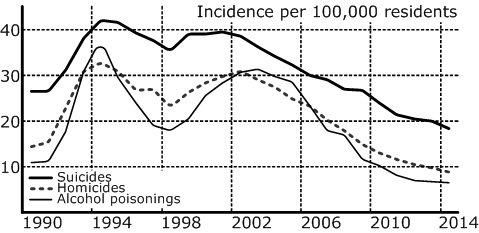
As we can see, these misery statistics rapidly deteriorated with the introduction of shock therapy in 1992, but the trend sharply reversed soon after Putin took charge. By 2014, these figures reached their lowest values since even before 1992. Along with these improvements, the nation’s demographic trends also experienced a dramatic turnaround. Russian life expectancy, which sunk to an average of barely 64 years (57 for men), rose steadily from the early 2000s to reach almost 72 in 2016, the highest it has ever been in Russia’s history.
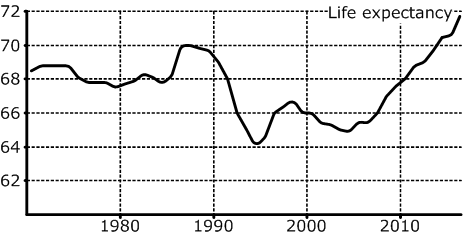
Looking at the way life expectancy in Russia changed over time, we see again that it had collapsed in the early 1990s but the trend turned around sharply under Vladimir Putin’s leadership of the country. Similarly fertility rate, which dropped to 1.16 babies per woman in 1999, increased by almost 50% to 1.7 babies by 2012, comparing favorably to European Union’s average of 1.55 babies per woman of childbearing age. Abortions declined 88% from a harrowing 250% of live births in 1993 to 31% in 2013.
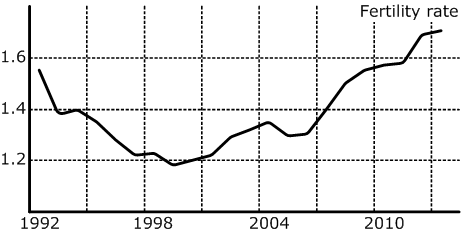
Not only are Russians living longer than ever before and enjoying much better quality of life, they also feel freer and happier. In 2014, Gallup Analytics reported that 65% of Russians, more than ever before, answered “Yes” when asked, “are you satisfied … with your freedom to choose what you do with your life?” Meanwhile, Russia’s happiness index rose more than tenfold, from 6 in 1992 to 70 in 2015. Happiness index, compiled by VCIOM[5] adds the proportion of the respondents reporting that they feel decidedly happy or generally happy and deducts those that report feeling generally unhappy or decidedly unhappy.
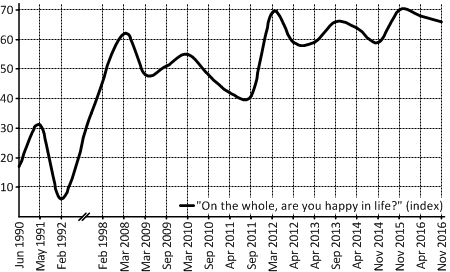
The next chart further corroborates the idea that under Putin’s leadership, Russia has been developing as a sane and prosperous society, not only for the benefit of a narrow ruling class and at everyone else’s expense, but for the vast majority of ordinary Russians.
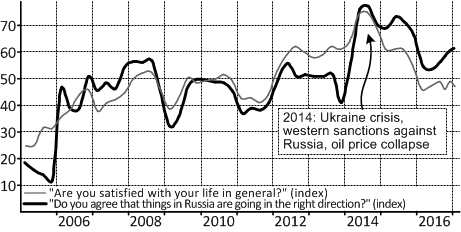
By 2014, the great majority of Russians felt satisfied with their lives and believed that things in Russia were moving in the right direction. These figures only tapered off after the 2014 western-sponsored coup in Ukraine and the subsequent economic sanctions imposed on Russia. At the same time, the price of oil – still one of Russia’s largest export – collapsed from over $100 per barrel to under $40. Economic sanctions and the oil price collapse triggered a significant crisis in Russia’s economy. However, in spite of the continuing sanctions regime imposed on the country, its economy started improving again in 2016, thanks to its diverse industrial base that includes a developed commercial and consumer automotive industry, advanced aircraft and helicopter construction based largely on domestic technologies, world’s leading aerospace industry building satellites and top class rocket engines, and advanced industries in pharmaceutical, food processing, optical device, machine tools, tractors, software and numerous other branches. Indeed, Russia is far from being just the “Nigeria with missiles,” or a “gas station with an army,” as many western leaders like to characterize it.
Insofar as a population’s sentiment is a valid measure of its leadership’s performance, Russia’s development under Vladimir Putin stands in sharp contrast with the weak performance of most other developed nations, including those that most vehemently criticize Russia and its president. According to polls conducted by Ipsos Public Affairs in 25 different countries in November 2016 and published by the World Economic Forum, almost two thirds of the people in the world believed that their countries were moving in the wrong direction. The leading western nations scored just as badly, while some among them did flat out dismally.
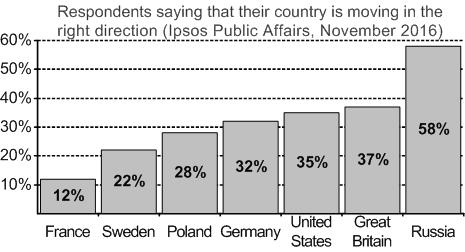
Evidently, Russians feel much better about the way their nation is shaping up than do constituents of many western nations[6] whose sanctimonious leaders like to lecture their Russian counterparts about prosperity, freedom, democracy and other exalted values they purport to cherish.[7] It may thus only surprise the most credulous consumers of western propaganda that a high proportion of Russian people trust Vladimir Putin and approve his job performance. In the early 2017, Putin’s job approval stood between 80% and 90% and has averaged 74% over the eleven years from 2006. During this period, no western leader has come even close to measuring up with Vladimir Putin.
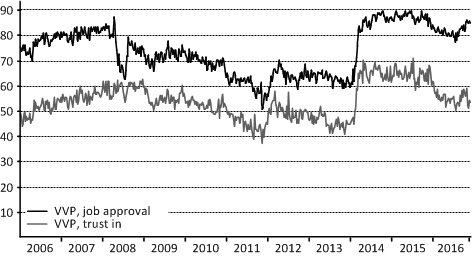
Over the years, I’ve heard depressingly many intellectuals attempt to dismiss Putin’s achievements and Russian people’s contentment as the product of Russian government propaganda. Putin the autocrat, you see, keeps such tight control over the media that he can deceive his people into believing that things in the country are much better than they really are. But the idea that government propaganda can influence public opinion in this way is just silly. If the majority of people thought their lives were miserable, state propaganda could not persuade them that everything is great. On the contrary, most people would conclude that the media is deceiving them and might feel even less positive about things as a result.[8] It is sillier still to think that western intellectuals should have a better appreciation of what it is like to live in Russia than the Russian people themselves. Rather than buying the truth from their media, such intellectuals would do well to take a trip and visit Russia, speak to ordinary people there, and reach their own conclusions. My own travels in Russia, as well as reports from other visitors largely agree with the positive picture that emerges from the statistics we’ve just examined.
The above article is an excerpt from my book “Grand Deception: The Truth About Bill Browder, the Magnitsky Act, and Anti-Russian Sanctions,” which was first published in August 2017 as “The Killing of William Browder” on Amazon.com. Only five weeks after its publishing, Bill Browder’s lawyers had the book suppressed. Clearly, dear reader, you aren’t meant to know what’s in it.


Alex Krainer - @NakedHedgie has worked as a market analyst, researcher, trader and hedge fund manager for over 25 years. He is the creator of I-System Trend Following, publisher of TrendCompass reports and contributing editor at ZeroHedge based in Monaco. His views and opinions are not always for polite society but they are always expressed in sincere pursuit of true knowledge and clear understanding of stuff that matters. BOOKS:
“Alex Krainer’s Trend Following Bible” (2021)
“Grand Deception: The Browder Hoax” (2017) twice banned on Amazon by orders of swamp creatures from the U.S. Department of State.
“Mastering Uncertainty in Commodities Trading” (2016) was rated #1 book on commodities for investors and traders by FinancialExpert.co.uk
WEBSITE: ISystem-TF.com
BLOG: TheNakedHedgie.com
YOUTUBE CHANNEL: MARKETS, TRENDS & PROFITS
LinkedIn: linkedin.com/in/alex-sasha-krainer-0b74ab1a
Notes:
[1] (Gorbachev: Putin saved Russia from disintegration 2014)
[2] (Stulb 2016)
[3] Some of the names arrested in 2016 surprised even the Russian public as they included such high caliber individual as the Mayor of Vladivostok, Igor Pushkarev; Governor of the Kirov region, Nikita Belykh; Governor of the Sakhalin region, Alexander Khoroshavin, Deputy Minister of Culture Grigory Pirumov and Minister for Economic Development, Aleksey Ulyukaev.
[4] (Romer 2016)
[5] ВЦИОМ – Russian Center for Research on Public Opinion
[6] A different, Associated Press – GfK poll in July of 2016 uncovered an even darker public sentiment in the United States: “A stunning 79 percent of Americans now believe the country is heading in the wrong direction, a 15-point spike in the past year…” (J. Pace 2016)
[7] VCIOM’s figures for November 2016 are somewhat higher than those of Ipsos (62% vs. 58%).
[8] This, for instance, was the situation in the late 1990s when only 5 to 10 percent of Russians thought that the country was heading in the right direction in spite of the ruling elite’s nearly total control of the media.
Pingback: Vladimir Putin’s 17 years in power: the scorecard - Grassyknoll
Thank you for a good article. The points about media is very revelent today in the US with the fake news and poke the elephant attacks everywhere.
It would be a interesting to match the US decline apposed to the Russian rebound, in honest real terms and numbers.
LikeLike
Pingback: Dear ABC Australia (lol) | NewZSentinel
I’m sure the Russian intelligence services hacked all the international authorities you quote in this article and manipulated the figures. There is just no other way this could be true! 🙂 Joke aside, thank you for this fact-rich overview.
LikeLiked by 1 person
Thank you Irina. =)
LikeLike
Pingback: THE KILLING OF WILLIAM BROWDER – Phi Quyền Chính – Anarchism
Pingback: Vladimir Putin’s 17 years in power: The scorecard | OffGuardian
Pingback: Vladimir Putin’s 17 years in power: The scorecard | OffGuardian – An Outsider's Sojourn II (The Journey Continues)
Pingback: Vladimir Putin’s 17 years in power: the scorecard | SHOAH
Pingback: How My Book Unmasking Bill Browder Was Censored by Amazon-Times of News Russia
I read a couple of paragraphs of this article and I must say that it is clear that you either write for the Kremlin or you have never been to Russia. I visited in 1992 the first time and lived on and off in Russia from 1999-2004 when Putin began to change the country for the worse. I then moved to Kyiv where I lived from 2005-2014. Outside of the two big cities, there has been no progress in the country at all. If you visit the countryside, you go back to the 19th Century. You refer to the rule of law in Russia. There is no rule of law; it is a mafia state run by a KGB thug who along with his pals has stolen the wealth of the country so that only vodka keeps people from total despair. You do an enormous disservice to write such tripe. I couldn’t read to the rest of the lies in this article. I was at Maidan and know people who were killed by the Russians. A friend was kidnapped from Ukraine, taken to Russian where he was tortured, then finally left for dead in the snow. He was lucky that somebody found him or otherwise he would have died. Putin supported Yanukovich and his goons who were robbing Ukraine and that’s why he was driven from the country. You need to find other sources than the Kremlin talking points.
LikeLike
Thank you Mark for reading a couple of paragraphs of this article. It was not my intent to imply that Russia is utopia or that bad things never happen there. My objective was simple: to counterbalance the uniformly negative press about Russia and Putin that’s presented in western press daily almost without exception. There are no lies in this article: it’s data from publicly available sources, some Russian, some western (Gallup, Ipsos, World Bank, Ernst&Young). 17 years ago Russia was on the verge of being a failed state. The progress it’s experienced since Putin came to power is nothing short of spectacular. And while you are focused on hating Russia, do you know the answer to this: which nation has initiated more than 80% of all international military conflicts in the world since 1946? How many people has NATO killed? How many nations have they devastated? How many millions maimed, killed and uprooted from their lives?
LikeLike
I was about to ask the commentator above if the World Bank and the IMF work for the Kremlin as well. 🙂 Quite possible, in the context of speculation that Putin is paying for the Catalonia referendum, for Brexit and, I suppose, for the Kurdistan referendum as well. Paranoia is seriously getting out of hand in Western Europe and the U.S. and that’s not good for anyone. Or is it…? 😉
LikeLike
Mr. Taylor seems to move close with US orchestrated color revolutions and nation building projects. Obviously he wouldn’t be able to do this if he wasn’t successfully brainwashed with the right kind of ideology.
LikeLiked by 1 person
Your book about the Magnitsky story is very enlightening, and this article is equally revealing, although you leave out other aspects of Mr Putin’s leadership, like his fight against lies and theft in the country, his defense of historical social mores, his partial exposure of the fascist elites – bent on establishing the rule of the Beast over the whole world in the near future, his own personal honesty – which explains why his own total assets, over many years, are lower than those of any average solicitor in the country. Nevertheless, I truly thank you for your effort. You show respect for the truth, even if the majority around you are averse to knowing it.
What does the future hold? Mr Putin and Russia are at present a serious impediment to the aims of the demon-possessed elites that rule the US and Europe. These are hell-bound to establish the rule of one man over the whole world, hence their onslaught on the Christian consensus, the nation-state, the family, the personal dignity of man (mankind). Russia, Putin, represent, at present, a symbol and a reality of opposition to their hellish ideology. It is temporary, though.
The seeds of destruction have been sown in Russia as well. Music is one of their most potent weapons. What percentage of youth in Russia hasn’t been taken over by the soul-destroying drumbeat of rock, metal, punk, rap, etc? The social consensus is also being changed in education, I suspect (no proof, but hints). If at present it is not allowed to promote the depravities of sodomy and pedophilia in the country, the next generation will not have such qualms. You have only to look at the journalists and public persons that are in their thirties and forties, even conservatives ones. They will swim with the tide, the hellish world tide, in the next generation of leadership.
Revelation 13 is being prepared at present.
Sam
LikeLike
Thank you Sam. While I agree with most of what you say, I’ve consciously limited myself to tings that are factual and that I can link to credible sources. The rest are beliefs. I am not shy about expressing my beliefs, but in a public forums anyone’s beliefs can easily be shot down by another person’s contrary beliefs. So I prefer to leave those out. As far as social trends go, yes, we have been badly led astray in the West, seduced with the ideas of progress and modernity and I suspect that the Russian people may be equally susceptible to this kind of seduction. However, tides do turn and the experiment in the West has left most people empty, lost, and unfulfilled. It is good to be aware of what’s going on, but rather than condemning what went wrong, we have to work on trying to uncover our true nature and try to lead the way back to ourselves. Even in the West the pendulum will swing back as is already beginning to happen.
LikeLiked by 2 people
Pingback: Θαυμαστὰ ἀποτελέσματα διακυβερνήσεως Ποῦτιν | DIAVASEME.GR
Thank you for the numbers, Alex. I can now use these with my MSM-tarnished friends. It is tangible evidence of the superior leadership of the world’s #1 statesman, who obviously cares much more about his people and country than supporting the MIC.
By the way, I bought your book, “The Killing of William Browder” – excellent! That guy is pure scum. He is a compendium of lies and deceit. I guess that is why he is so accepted in the good old USA.
LikeLike
Thank you!! =)
LikeLike
Pingback: The Zionist Engineered Russian Shock Transition Which Took 5 Million Lives in the 1990’s-Zionist Browder Became Filthy Rich Looting Defenseless Russia – Brutal Proof
Pingback: Vladimir Putin’s 17 years in power: The scorecard – OffGuardian